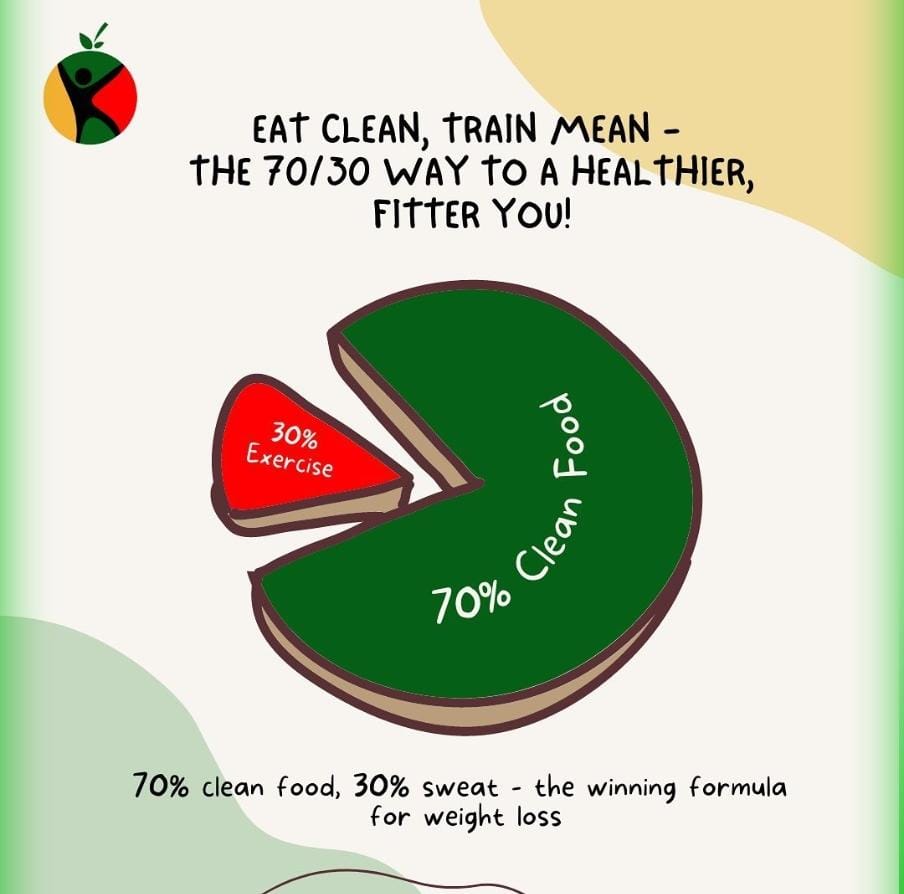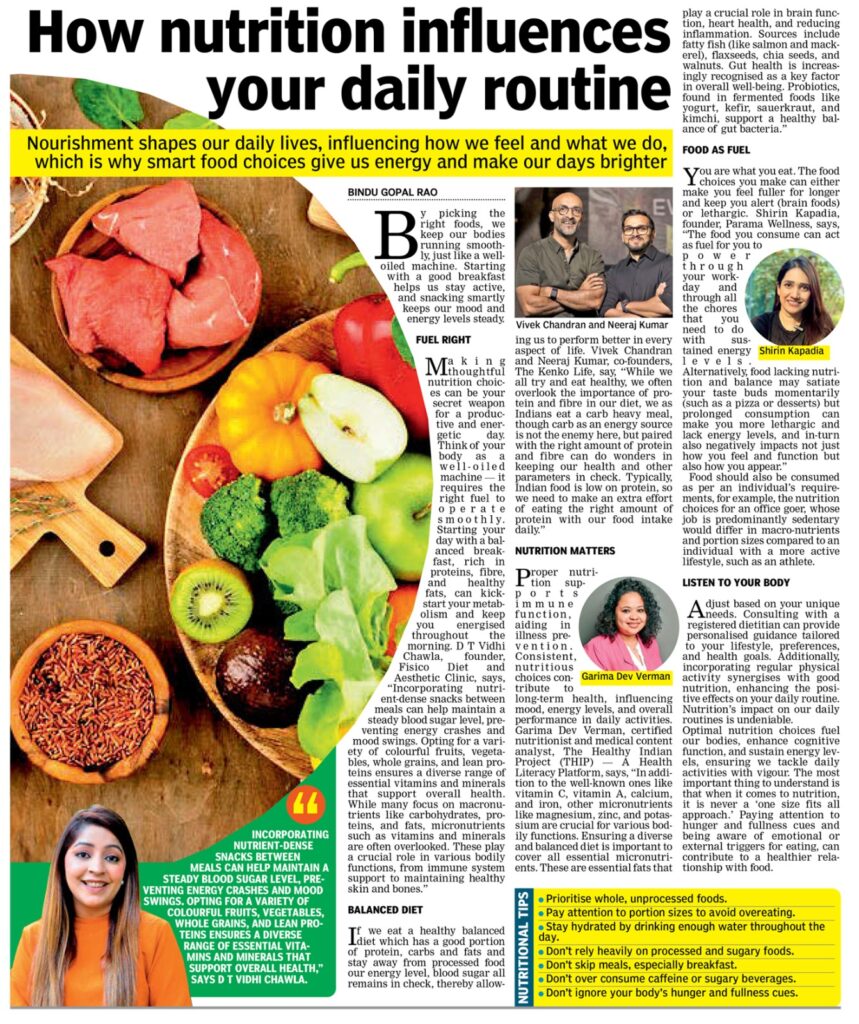While we all know that we must inculcate a healthy lifestyle in terms of exercise, sleep and food, but making food i.e. the right nutrition plays a key role in all of it.
Tips
- Try to eat more unprocessed foods.
- Always try to eat your veggies and protein first and then go to the carbs.
- Eating enough fibre via veggies helps your gut microbiome to stay healthy thereby keeping you always from a lot of chronic disease as well as makes you less hungry along with providing you with a wide variety of vitamins.
- Fats are not the enemy; we should consume 20-30% of our calories from good fats.
- Always aim to walk more if you don’t have time to work out. Considering the busy lifestyles of individuals, make sure to walk at least 7500-10000 steps.
- Don’t look for quick fixes to weight loss or living healthy
- Stay away from juice detoxes, they do more harm than benefit, rather stick two eating 1-2 fruits a day,it helps in the long run and doesn’t dent your pocket as well.
- Processed and fried food adds a lot of unwanted calories, so sticking to whole food is your way to go.
- Don’t run behind fad diets which aren’t sustainable, rather stick to eating healthy balanced meals.
Maintaining a healthy routine involves more than just focusing on a few specific nutrients. While water is essential, other beverages and foods contribute to overall hydration. Herbal teas, fruits, and vegetables with high water content (like watermelon and cucumber) also play a role. The timing of meals and snacks can impact energy levels and metabolism. Eating balanced meals and snacks at regular intervals can help maintain stable blood sugar levels. Nutritional needs vary from person to person based on factors like age, gender, activity level, and health conditions. Tailoring nutrition to individual requirements is often overlooked in favour of generalized advice.
- Diversify Your Diet: Consume a variety of fruits, vegetables, lean proteins, and whole grains to ensure a broad spectrum of essential nutrients.
- Stay Hydrated: Adequate water intake supports overall health, aiding digestion, maintaining energy levels, and promoting clear cognitive function.
- Mindful Portions: Pay attention to portion sizes to avoid overeating and maintain a healthy weight.
- Excessive Processed Foods: Restrict the consumption of processed foods high in sugars, unhealthy fats, and additives to mitigate the risk of various health issues.
- Skip Meals: Steer clear of skipping meals to prevent energy crashes and the subsequent tendency to overcompensate with unhealthy snacks.
- Overlook Nutrient Balance: Ensure a well-rounded intake of carbohydrates, proteins, and fats for comprehensive support of overall health and well-being.
- Avoid Fad Diets: Refrain from engaging in trendy, restrictive diets that often lack long-term sustainability and may compromise nutritional balance.
- Individual Nutrition: Resist the temptation to follow diet tips on platforms like Instagram, as nutrition is individualised, and one-size-fits-all approaches may not be suitable for everyone. Avoid idolising specific nutrition plans without considering personal needs and preferences.
In India, most people suffer from protein deficiency, as per a study by the Indian Council of Medical Research (ICMR). Protein is a very important macro nutrition and is essentially made up of building blocks, called amino acids for our body. Our body utilises these amino acids to build and repair muscles and bones. Consuming protein can maintain and increase lean muscle mass and hence help increase strength. Consuming protein can keep one feeling fuller for longer and help reduce cravings and boost metabolism, which in turn can facilitate fat loss. Intermittent fasting is the latest buzz when it comes to losing weight. It doesn’t tell you what foods to consume and what to avoid but just follows an eating and fasting window (typically starts at 16hours fasting window), but again follow such with the guidance of an expert, since it may aggravate the glucose levels for a woman rather than improving it.
- Energy Levels: Nutrient-rich foods provide sustained energy throughout the day, preventing energy crashes and fatigue.
- Mental Focus: Balanced nutrition supports cognitive function, enhancing concentration and productivity in daily tasks.
- Mood Stability: Proper timely nutrition regulates neurotransmitters, promoting stable moods and emotional well-being.
- Immune Support: Nutrient-dense foods strengthen the immune system, reducing the risk of illness and disruptions to routine.
- Physical Health: Good nutrition facilitates overall health, enabling optimal physical performance and stamina.
- Digestive Regularity: A well-balanced diet supports digestive health, preventing discomfort and promoting regularity in daily routines.
Fad diets are not sustainable in the long run. Yes, following restrictive diets will give you results but in the short term, constantly following a restrictive diet and leaving it again and again will slow your metabolic rate in the long run. A more balanced diet can be boring for most but it is what will work in the long term. Plus most important thing to note is that following a good nutrition plan should make you look better, You try great skin, lovely hair, bright and radiant and even feeling more energetic throughout the day, but losing weight may show loss of weight on the weighing scale but if you feel tired, look tired, are losing hair and end up looking weak and sick, then the diet is defiantly not working for you.
Read the full story that first appeared in Deccan Chronicle dated 25 Jan, 2024 here:


